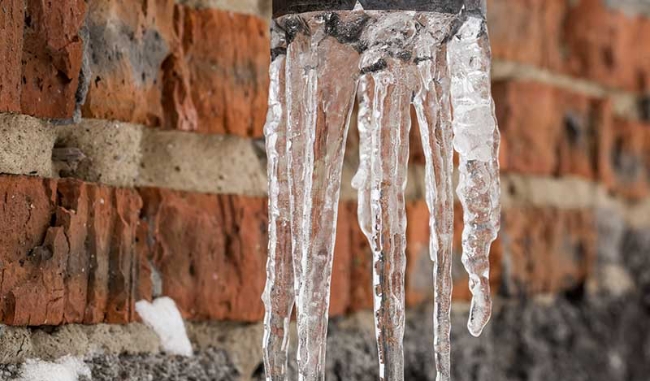Just how do you actually feel about Prevent Frozen Pipes ?

Cold weather can damage your plumbing, especially by freezing pipes. Right here's exactly how to avoid it from occurring and what to do if it does.
Introduction
As temperatures decrease, the risk of icy pipelines increases, possibly causing costly repair services and water damages. Recognizing how to stop icy pipes is important for homeowners in chilly environments.
Avoidance Tips
Protecting susceptible pipelines
Wrap pipelines in insulation sleeves or utilize heat tape to secure them from freezing temperatures. Focus on pipelines in unheated or exterior locations of the home.
Home heating methods
Maintain interior areas properly heated up, specifically areas with plumbing. Open up closet doors to allow warm air to distribute around pipelines under sinks.
Just how to recognize frozen pipes
Search for reduced water flow from faucets, unusual odors or noises from pipes, and visible frost on subjected pipes.
Long-Term Solutions
Structural adjustments
Consider rerouting pipes far from outside wall surfaces or unheated areas. Add extra insulation to attic rooms, cellars, and crawl spaces.
Upgrading insulation
Invest in top quality insulation for pipes, attic rooms, and walls. Correct insulation helps keep constant temperature levels and reduces the risk of frozen pipelines.
Shielding Outdoor Plumbing
Garden hoses and exterior taps
Detach and drain garden hoses prior to winter months. Install frost-proof faucets or cover outdoor faucets with shielded caps.
Understanding Frozen Pipelines
What causes pipes to freeze?
Pipelines ice up when exposed to temperatures listed below 32 ° F (0 ° C) for expanded durations. As water inside the pipes freezes, it expands, putting pressure on the pipe wall surfaces and possibly creating them to break.
Threats and problems
Icy pipelines can bring about water supply disruptions, residential or commercial property damage, and pricey repairs. Burst pipelines can flood homes and cause comprehensive structural damages.
Indications of Frozen Pipeline
Identifying icy pipelines early can prevent them from breaking.
What to Do If Your Pipelines Freeze
Immediate actions to take
If you believe frozen pipelines, keep taps available to alleviate stress as the ice melts. Make use of a hairdryer or towels soaked in warm water to thaw pipelines gradually.
Verdict
Preventing frozen pipelines calls for proactive procedures and quick responses. By recognizing the causes, indications, and preventive measures, house owners can shield their plumbing during winter.
Helpful Tips to Prevent Frozen Pipes this Winter
UNDERSTANDING THE BASICS: WHY PIPES FREEZE AND WHY IT’S A PROBLEM
Water freezing inside pipes is common during the winter months, but understanding why pipes freeze, and the potential problems it can cause is crucial in preventing such incidents. This section will delve into the basics of why pipes freeze and the associated problems that may arise.
THE SCIENCE BEHIND FROZEN PIPES
When water reaches freezing temperatures, it undergoes a physical transformation and solidifies into ice. This expansion of water as it freezes is the primary reason pipes can burst. As the water inside the pipe freezes, it expands, creating immense pressure on the walls. If the pressure becomes too great, the pipe can crack or rupture, leading to leaks and water damage.
FACTORS THAT CONTRIBUTE TO PIPE FREEZING
Low Temperatures: Extremely cold weather, especially below freezing, increases the risk of pipes freezing. Uninsulated or Poorly Insulated Pipes: Pipes located in unheated areas, such as basements, crawl spaces, or attics, are more prone to freezing. Insufficient insulation or lack of insulation altogether exacerbates the problem. Exterior Wall Exposure: Pipes running along exterior walls are susceptible to freezing as they encounter colder temperatures outside. Lack of Heating or Temperature Regulation: Inadequate heating or inconsistent temperature control in your home can contribute to frozen pipes. PROBLEMS CAUSED BY FROZEN PIPES
- Pipe Bursting: As mentioned earlier, the expansion of water as it freezes can cause pipes to burst, resulting in significant water damage.
- Water Damage: When pipes burst, it can lead to flooding and water damage to your property, including walls, ceilings, flooring, and personal belongings.
- Structural Damage: Prolonged exposure to water from burst pipes can compromise the structural integrity of your home, leading to costly repairs.
- Mold and Mildew Growth: Excess moisture from water damage can create a favorable environment for mold and mildew growth, posing health risks to occupants.
- Disrupted Water Supply: Frozen pipes can also result in a complete or partial loss of water supply until the issue is resolved.
WHY CERTAIN PIPES ARE MORE PRONE TO FREEZING
- Location: Pipes located in unheated or poorly insulated areas, such as basements, crawl spaces, attics, or exterior walls, are at higher risk of freezing.
- Exterior Pipes: Outdoor pipes, such as those used for irrigation or exposed plumbing, are particularly vulnerable to freezing as they are directly exposed to the elements.
- Supply Lines: Pipes that carry water from the main water supply into your home, including the main water line, are critical to protect as freezing in these lines can affect your entire plumbing system.
- Underground Pipes: Pipes buried underground, such as those connected to sprinkler systems or outdoor faucets, can be susceptible to freezing if not properly insulated.
https://busybusy.com/blog/helpful-tips-to-prevent-frozen-pipes-this-winter/

I'm just very eager about Winter Plumbing Precautions: Preventing Frozen Pipes and I hope you appreciated my entry. Are you aware of another individual who is truly interested in How To Avoid Freezing Pipes? Take a moment to promote it. Many thanks for taking the time to read it.
Suggested Site